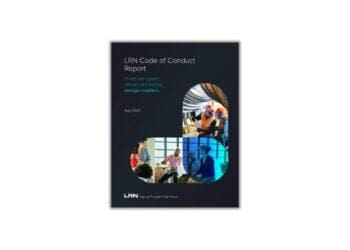A review by LRN, an ethics and compliance training provider, indicates that many of the top public companies around the world appear to fall short when it comes to providing something as foundational as an effective code of conduct.
LRN’s analysis, released last week, revealed deep disparities in the codes of conduct for top publicly traded companies, suggesting the majority have a long way to go to meet basic expectations for code effectiveness.
The study indicates that only half of the codes reviewed meet what LRN calls “minimum expectations,” while only about one in six publicly traded companies rise above the minimum with more effective codes of conduct. LRN researchers reviewed available codes of conduct of nearly 150 of the top publicly traded companies in France, Germany, the UK and the U.S. LRN’s study rated 33 percent of codes as “less effective.”
In particular, many of the codes reviewed lack guidance around speaking up and specifics to protect those who do. While 96 percent of the most effective codes describe the process for speaking up to report misconduct, only 8 percent of the least effective codes do, and only 60 percent of all codes have strong non-retaliation policies stated for those who do speak up.
“Codes of conduct are the cornerstone of an [ethics and compliance] and provide guidance for all employees, including top executives,” Jim Walton, LRN senior E&C adviser, said in a statement. “LRN’s research and experience has shown that in organizations with highly effective E&C programs, the C-suite understands the compliance risks facing the organization and supports mitigation measures. Our report reveals that even the top publicly traded companies in the world, while they may identify risks, don’t have a strong or engaging code of conduct that leads with values.”
For its analysis, LRN assesses code of conduct effectiveness across eight dimensions that include areas like what the code of conduct says, as well as how easily employees can access and understand it.
Overall performance: Room for improvement just about everywhere
Only 50 percent of the largest companies in the world had codes of conduct LRN rated as “effective,” meaning they meet base-level expectations. Seventeen percent were rated as “less effective,” falling below LRN’s minimum threshold for effective codes of conduct.
Here are a couple of other findings in this area:
- Publicly traded companies with fewer employees and less revenue have less effective codes of conduct. Companies with 5,000 to 25,000 employees scored lower in code of conduct effectiveness across regions.
- Codes of companies on the U.S. S&P index outperform those in other indexes across nearly all dimensions of code effectiveness. Companies listed on France’s CAC 40 have the lowest code effectiveness scores.
Most codes cover speaking up, but many lack strong non-retaliation policies
A core element of an effective code of conduct is to ensure that not only are employees encouraged to speak up when they see an ethical violation but that the company takes a strong stance against retaliation for those who report violations.
Overall, 73 percent of codes include a section on speaking up, and among the codes rated as more effective, 100 percent have sections encouraging people to report conduct violations. However, only 60 percent of codes include strong policies against retaliation — and one in four codes don’t have a speak-up section at all.
Here are a couple of additional insights on reporting and investigating unethical behavior:
- Companies with more effective codes are 10 times more likely to include hotline/helpline details: 96 percent compared to only 8 percent of less effective codes.
- Only 17 percent of all codes explain the procedure for investigation of misconduct.
Liability and risk issues
A significant number of codes fail to extend to third parties, which can open companies up to accountability for the actions of outside parties. Here are a couple of findings regarding liability and risk issues:
- Only 53 percent of all codes extend applicability to contractors, agents and others working on behalf of the company.
- Sixty-four percent of all codes provide the business rationale related to specific risks, allowing employees to understand how a specific behavior connects to their own work.
LRN’s proprietary Code of Conduct assessment tool reflects regulatory and best practice guidance along with additional research into ethical culture and compliance program effectiveness, a company spokesperson said.
Among improvements LRN suggests for companies whose codes fall short are ensuring documents are web-based, searchable and interactive, that they include diversity, equity and inclusion content and that they have been updated to address ESG obligations and goals.










